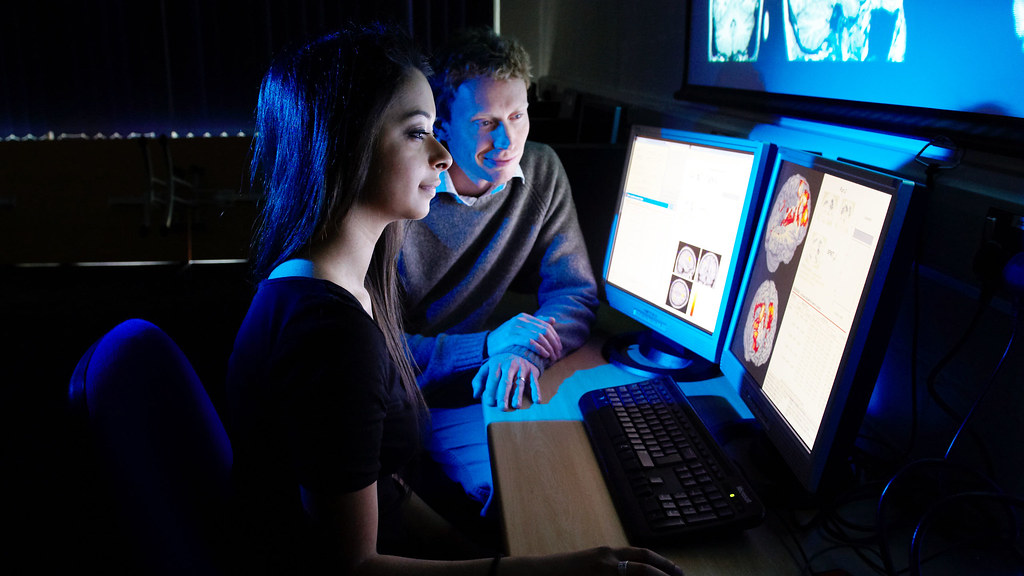Research by Dr Elizabeth Marks has shown that Mindfulness Based Cognitive Therapy for Tinnitus (MBCT-t) is an effective treatment for debilitating tinnitus. This research has enabled changes in clinical practice which have led to:
- significant, long-term reductions in tinnitus severity
- improved quality of life for patients
- decreased patient re-referral rates
An inner experience of sound
Many patients report hearing a noise, such as a buzzing when there is no external sound source present.
Tinnitus is the name for the perception of hearing a noise, such as ringing or buzzing, when there is no identifiable corresponding external sound. Many patients report suffering from associated problems linked to this which can include depression, anxiety, insomnia, as well as impaired cognition, functioning and a reduced quality of life. People often feel very alone and isolated because tinnitus is an ‘invisible’ condition which others may find hard to recognise and understand.
Six million people in the UK report tinnitus and more than 40 million across Europe. The estimated societal cost of tinnitus in the UK is estimated to be £2.7 billion each year.
There is no known medical or surgical cure that can silence tinnitus. For decades, most patients have only received treatment in the form of:
- sound therapy
- advice to resist tinnitus (such as partial masking)
- relaxation
- supportive counselling
Traditional approaches have been found to often be unsatisfactory in treatment and have minimal patient benefit, with high rates of re-referral and ongoing help-seeking. Psychological treatments have far better outcomes but are rarely offered or are inaccessible to most patients.
Mind over matter
Mindfulness sessions involve group talking and meditative activities to bring a sense of calm and acceptance.
MBCT-t sessions teach patients to relate to tinnitus in a different way. This is done with small groups involving 8 to 16 people meeting over a series of around 8 weeks with a facilitator trained in mindfulness-based treatments. Sessions can take place in person or virtually, where participants are encouraged to:
- focus on their breathing
- present moment awareness
- learn through some teachings
- discuss their experience with others
- become more aware of their bodies
- share poems and stories
The aim of these sessions is to teach participants to allow sounds to be present, learning to accept tinnitus rather than seeing it as something they need to fight with. Patients' recovery and quality of life are enhanced through this.
The use mindfulness as an approach to help with tinnitus was first introduced by Dr Laurence McKenna who co-authored this research. It was inspired by research into using similar methods to treat chronic pain and depression.
Comparing MBCT-t with group-based relaxation
Dr Marks conducted a series of research studies including a randomised controlled clinical trial, where MBCT-t was compared to a formal, group-based relaxation training method that often forms part of traditional treatments. Relaxation training was chosen because it shares similarities with MBCT-t (in terms of duration, group-structure, focus on learning a new skill, and home practice requirements). It therefore offered a good comparator to test whether a focus on mindfulness specifically could lead to a significant difference in outcome.
The mindfulness was more helpful than relaxation in reducing tinnitus severity. Following MBCT-t 59% of people got better after the sessions, which increased to 62% after 6 months. An interview study showed that MBCT-t led to a wide range of benefits to mood, stress and quality of life, in addition to tinnitus. Results from a large, uncontrolled clinical evaluation of MBCT-t in a complex NHS sample showed a similar pattern of improvement, with recent findings suggesting such benefits can persist for over 5 years.
The findings from this research showed that MBCT-t profoundly changes how people think about and relate to tinnitus. This in turn reduces tinnitus severity, psychological distress, anxiety, depression and functional disability and improves overall quality of life.
Impact makes a sound
The findings from this research were published in prominent journals including Psychotherapy and Psychosomatics, Frontiers in Psychology, Ear and Hearing and the British Journal of Health Psychology.
This has informed the development of new guidelines by the National Institute for Health and Care Excellence (NICE) 2000 and European Tinnitus Guidelines (TINNET) 2019 to advocate for the use of mindfulness therapies as an effective treatment.
The research has also reshaped teaching and training for audiology professionals. Dr Marks has regularly delivered about mindfulness for tinnitus to the University College London Ear Institute and the British Tinnitus Association for the past 5 years, as well as training for Specsavers. Other UK-based audiology lecturers have now begun to teach mindfulness to trainee audiologists, because of this research.
While the findings from this research show that psychological based treatments are beneficial in the treatment of tinnitus, it should not be seen as evidence that tinnitus is not a physical condition. Dr Liz Marks explains:
Tinnitus is a real, physical symptom. As with other physical conditions (for example, cancer or diabetes), psychological factors are important because they can affect how great an impact the condition has on one’s life. For example, stress affects the body, and in turn this can make symptoms (such as tinnitus) worse. Other factors that can worsen symptoms include anxiety, catastrophic thinking and changes in behaviour.
Psychological therapies can teach people skills to reduce stress and change their thoughts and behaviours in ways that reduce the impact their condition has on them. This is particularly important in tinnitus where we are yet to fully understand the mechanisms causing tinnitus or a 'cure' that can 'silence' it. Researchers are actively seeking cures, and there are developments on the horizon.
Psychological therapies don't replace medical approaches, but are a concurrent form of treatment that can have huge benefits for some people, in terms of reducing the distress and impact of tinnitus, and getting them to a place where tinnitus is no longer problematic, even if the sound of tinnitus remains.




